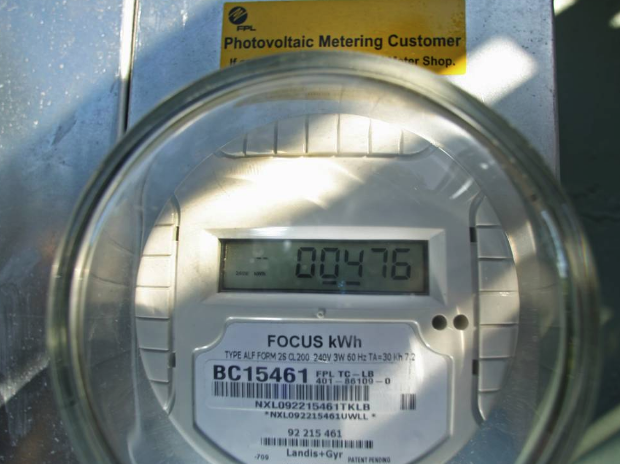Reporters Mary Ellen Klas and Mario Alejandro Ariza at The Miami Herald published an excellent piece recently on the dirty tricks monopoly utility Florida Power & Light has employed to try to kill Florida's nascent solar industry.
Rooftop solar power generation in Florida is still a nascent industry, but Florida Power & Light, the nation’s largest power company, is pushing to hamstring it — by writing and delivering legislation the company asked state lawmakers to introduce, according to records obtained by the Miami Herald and Floodlight. FPL, whose work with dark-money political committees helped to secure Republican control of the state Senate in the 2020 elections, asked state Sen. Jennifer Bradley to sponsor its top-priority bill: legislation that would hobble rooftop solar by preventing homeowners and businesses from offsetting their costs by selling excess power back to the company, an arrangement known as net metering. Records from the Florida Senate show that FPL drafted the bill, and lobbyist John Holley delivered it to Bradley, R-Fleming Island, and FPL’s parent company followed up with a $10,000 contribution to her political committee. Bradley filed the bill in November. A week later, state Rep. Lawrence McClure, R-Plant City, introduced an identical version in the House.
Only about 90,000 Florida customers, about 1% of the state’s more than 8.5 million customers, sell excess energy back to the electrical grid, but the arrangement has driven significant rooftop solar expansion in Florida. The proposed legislation could seriously curtail that growth. FPL is pushing for it as Florida’s biggest utility — it has 5.5 million customers, about 65% of the state. Duke has 2 million customers, followed by TECO with 800,000 and then many other smaller utilities. The solar industry — companies that make, sell, install, lease and maintain rooftop solar equipment — is fighting back fiercely, suggesting that the bill will devastate its business.
“This is a tired tactic that utilities have used to maintain their monopoly grip on electricity markets. Net metering is a popular program that gives people the right to choose the energy that works for them, provides benefits to all ratepayers and creates thousands of energy jobs across Florida.
”
But FPL is arguing rooftop solar could cost Florida utilities about $700 million between 2019 and 2025, according to documents submitted to the Florida Public Service Commission. That’s a trend nationwide, as power company profits are threatened by the rise of distributed renewable energy — a technology which scientists say is essential to limiting the pollution that causes the climate crisis. FPL spokesperson Chris McGrath said the company doesn’t oppose net metering but wants to see the current law revised. He argued that customers with rooftop solar are being subsidized by other customers who continue to buy electricity and pay to maintain the power grid. “We simply believe rooftop solar customers should pay the full cost of this investment,” McGrath said.
The bill is just one front in a decade-long battle against the policy. For years, FPL has been one of the largest contributors to legislative Florida political campaigns. It backed a failed ballot amendment in 2016 that would have allowed regulators to impose fees and barriers to rooftop solar installation. FPL has also invested millions into groups with untraceable, anonymous donors that launched attacks on state and local politicians.
According to reporting by the Orlando Sentinel, FPL executives have been tied to a series of ‘dark-money’ nonprofits, one of which figures prominently in the Miami-Dade state attorney’s investigation into a scandal involving a “ghost” Senate candidate. Under the scheme, a candidate with no political background was on the ballot as a no-party option in an effort to confuse voters and dilute support for the Democrat in the race, helping Republicans maintain their majority in the state Senate. FPL CEO Eric Silagy was directly involved in steering money to dark-money groups led by the consultants who controlled Grow United, the organization used to promote the ghost candidates, according to documents obtained by the Sentinel.
Holley, the FPL lobbyist who delivered the net metering language to the Senate, worked to promote Republican Senate candidates in the close races. FPL denied any wrongdoing related to political campaigns. “Any report or suggestion that we had involvement in, financially supported or directed others to support any ‘ghost’ candidates during the 2020 election cycle is patently false, and we have found absolutely no evidence of any legal wrongdoing by FPL or its employees,” McGrath, the FPL spokesperson said in response to questions for this story. Records obtained by the Sentinel also show overlap between Grow United and previous campaigns to overhaul net metering.
One person affiliated with Grow United is Abbie MacIver, who formerly worked for Energy Fairness, a group that encourages policymakers to consider the “cost of energy choices, as well as their benefits.”
Last year, McClure sent a letter to state regulators at the Florida Public Service Commission citing the result and urging it to update its net metering rule. The commission held a workshop, which drew 16,000 messages from solar advocates urging it to leave the net metering program alone. Commissioners said it was the highest response rate they had received on any issue and concluded that no immediate changes to net metering needed to be made.
“What people may not realize is that public opinion is very much in our favor,’’ said Bryan Jacob of the Southern Alliance for Clean Energy. “They’ve got the lobbying power, and we’ve got the people power.”
Read more at The Miami Herald.


